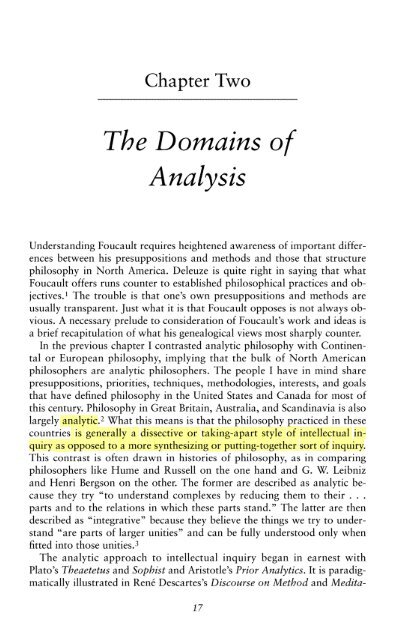Starting with Foucault: An Introduction to Genealogy, Second Edition
Starting with Foucault: An Introduction to Genealogy, Second Edition
Starting with Foucault: An Introduction to Genealogy, Second Edition
Create successful ePaper yourself
Turn your PDF publications into a flip-book with our unique Google optimized e-Paper software.
Chapter TwoThe Domains oUnderstanding <strong>Foucault</strong> requires heightened awareness of important differencesbetween his presuppositions and methods and those that structurephilosophy in North America. Deleuze is quite right in sdying that what<strong>Foucault</strong> offers rwns coLlnter <strong>to</strong> established philosophical practices and objectives.1The trouble is that one's own presuppositions and methods areusually transparent, just what it is that <strong>Foucault</strong> opposes is not always obvious,A necessary prelude <strong>to</strong> consideratim of <strong>Foucault</strong>'s work and ideas isa brief recapitulation uf what his genealogical views most sharply counter,Tn the previous chaptcr f contrasted analytic philosophy <strong>with</strong> Continentalor European philosoph?i, implying that the bulk of North Americanphilosophers are analytic philosophers, The people 1 have in mind sharepresuppositians, priorities, techniques, methodologies, interests, and goalsthat have deiined philosophy in the United Scares 2nd Canada for most ofthis century. Philosophy in Great Britain, Australia, and Scandinavia is alsolargely anaIytic.Vhat this means is that the philosophy practiced in thesecountries is generally a dissective or takil-tg-apart style of intelleaual inquiryas upposed <strong>to</strong> a more synthesizing m putting-<strong>to</strong>gether sort of inquiry,This contrast is often drawn in his<strong>to</strong>ries of philosophy, as in comparingphilosophers like Hurne and Russell on the one hand and G. W. Leibniaand Wenri Bergson on the other. The fctrmer are described as analytic becausethey try "CO understand complexes by reducing them <strong>to</strong> their . . .parts and <strong>to</strong> the relations in which these parts stand."" The latter are thendescribed as "integrative'3hecause they believe the things we try <strong>to</strong> understand""are parts of larger unities">nd can he fully unders<strong>to</strong>od only whenfitted in<strong>to</strong> those unities.3The analytic approach <strong>to</strong> intellectual inquiry began in earnest <strong>with</strong>Pla<strong>to</strong>'s Theaetet~s and Sophkt and Aris<strong>to</strong>tle" Prior Amlytics. It is paradigrnatieallyillustrated in Rent5 Bescartes's DDzourse on Method and Medita-


